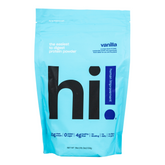Most people think of creatine as a muscle-building supplement. But at its core, creatine is cellular fuel. And your health — from how you think, feel, move, and age — starts at the cellular level.
Inside your cells, creatine helps maintain energy balance, support mitochondrial function, protect against oxidative stress, and even regulate key genes involved in longevity. In short: creatine doesn’t just help you perform better — it helps your cells work better.
In this article, we’ll explore how creatine supports cellular health, why that matters for whole-body function, and how it may be one of the simplest ways to improve energy, recovery, and resilience.
1. What Is Cellular Health and Why Does It Matter? 🧬
Cellular health is exactly what it sounds like — the health of your individual cells, the basic building blocks of your body.
Healthy cells mean:
✔️ More energy production
✔️ Better communication between systems (immune, brain, muscle, etc.)
✔️ Faster repair and regeneration
✔️ Less inflammation and oxidative stress
When cells can’t produce enough energy or clear waste efficiently, the results show up in every system — fatigue, slow recovery, immune dysfunction, and premature aging.
🧬 “If you take care of your cells, your cells take care of everything else.”
2. How Creatine Supports Cellular Energy ⚡
Your cells use a molecule called ATP (adenosine triphosphate) as their main source of energy. But ATP gets used up quickly and must be replenished constantly — especially in high-energy-demand tissues like your brain, heart, and muscles.
This is where creatine shines.
Creatine stores high-energy phosphate groups and donates them to rapidly regenerate ATP — making it essential for cellular energy buffering.1
That means your cells stay energized longer, especially under stress, during workouts, or when you’re recovering from illness or injury.
⚡ Creatine helps your cells keep up with demand — and bounce back from depletion.
3. Creatine Boosts Mitochondrial Function 🔋
Mitochondria are the “powerhouses” of your cells — they generate the majority of ATP. When mitochondria are working efficiently, your body runs smoothly. When they’re impaired, energy production drops and inflammation increases.
Creatine has been shown to:
- Support mitochondrial function and ATP synthesis2
- Protect mitochondria from oxidative damage
- Improve mitochondrial density in muscle and brain tissue
This matters not just for energy but for long-term health — mitochondrial dysfunction is linked to fatigue, brain fog, aging, and chronic disease.³
🔋 Creatine is like a support system for your cellular batteries — helping them charge faster and last longer.
4. Antioxidant & Cytoprotective Effects 🛡️
Oxidative stress occurs when your body produces more free radicals than it can neutralize. Over time, this damages cells, DNA, and mitochondria, contributing to inflammation and aging.
Creatine acts as a cellular shield by:
- Scavenging free radicals directly
- Increasing antioxidant enzyme activity
- Reducing markers of oxidative stress in muscle, liver, and brain tissue4
It also helps protect against cell death during times of extreme stress (e.g. sleep deprivation, toxin exposure, intense exercise).
🛡️ Think of creatine as part fuel, part fire extinguisher — keeping cells both energized and protected.
5. Creatine and Cellular Signaling 🔃
Beyond energy, creatine also influences cell signaling pathways that affect inflammation, repair, and longevity.
Some research suggests that creatine can:
- Regulate genes involved in antioxidant defense and protein synthesis
- Influence mTOR signaling (important for recovery and growth)
- Play a role in autophagy — your body’s natural cellular cleanup process5
In other words, creatine doesn’t just fuel what’s happening now — it helps regulate how your body adapts and heals in the long term.
📈 Better signaling = better recovery, better adaptation, and better aging.
The Takeaway 💡
Creatine isn't just about muscles — it's about function. At the cellular level, it supports energy, protection, and communication — three pillars of optimal health.
That’s why we designed Performance Creatine not just for physical performance, but to support the body’s most fundamental needs: energy production, stress resilience, and healthy aging — from the inside out.
Keep learning about creatine 📚:
- 👉 Creatine for Brain Function & Mental Health
- 👉 5 Creatine Benefits That Have Nothing to Do With the Gym
- 👉 Creatine for Healthy Aging
- 👉 Creatine and Sleep
References 🔎
- Wyss, M., & Kaddurah-Daouk, R. (2000). Creatine and creatinine metabolism. Physiol Rev, 80(3), 1107–1213.
- Gualano, B. et al. (2016). Creatine and mitochondrial function. Nutr Rev, 74(11), 727–736.
- Picard, M. et al. (2016). Mitochondrial dysfunction and the pathophysiology of aging. Nat Rev Mol Cell Biol, 17(9), 585–600.
- Sestili, P. et al. (2011). Creatine as an antioxidant. Amino Acids, 40(5), 1385–1396.
- Safdar, A. et al. (2008). Gene expression in muscle after creatine supplementation. Physiol Genomics, 32(2), 219–228.









